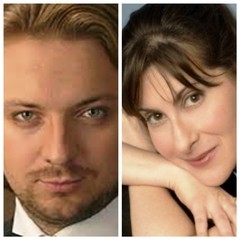|
Back
A Major Work Uncovered New York
Perelman Auditorium, Carnegie Hall
12/09/2016 -
Denounced!:
Nikolai Miaskovsky: Symphony No. 25
Dmitri Shostakovich: From Jewish Folk Poetry, Opus 79
Sergei Prokofiev: Symphony No. 6 in E-flat Minor, Opus 111
Ilana Davidson (Soprano), Katharine Goeldner (Mezzo-soprano), Sergey Polyakov (Tenor), Jiyoung Moon, Adina Mu-Ying Tsai, Caleb Wong (Interlocutors)
The Orchestra Now (TON), Leon Botstein (Conductor)

S. Polyakov/I.Davidson (© ImgArtists/Courtesy of the Artist)
Leon Botstein’s newest creation, “The Orchestra Now” (TON) partly replicates Michael Tilson Thomas’s “New World Symphony”. Both conductors form (what Mr. Botstein calls) a “pre-professional orchestra.” Mr. Thomas’s international artists come to Florida in order to learn everything about orchestral playing. Mr. Botstein’s equally international group attend Bard College, where they are preparing for their Master’s Degree.
Both orchestras also are averse to the “usual” repertoire. The New World Symphony commissions and performs new works almost exclusively. Mr. Botstein’s TON has so far (they are in their second season) play unusual works from several centuries. Doubtless, they will commission works (probably from Bard composers) later in their musical lives.
The difference is that Michael Tilson Thomas’s orchestra already sounds professional. TON is pretty ragged around the edges, not even close to the conductor’s usual American Symphony Orchestra. And while Mr. Botstein’s eclectic expertise is near incredible, his conducting is simply not enough to lift these players to what should have been a fascinating program.
The commonality of Miaskovsky, Shostakovich and Prokofiev was the late 1940’s miasma called Zhdanovschchina, where an obsequious spokesman for Josef Stalin viciously, crudely criticized music which apparently was too “Western” or “bourgeois”.
Shostakovich had gone on this dismal merry-go-around throughout his career. (Julian Barnes’ novel The Noise of Time depicts his torture more than any facts.) Prokofiev also stumbled when returning to Russia, thinking he would be called a hero. Miaskovsky was more to Stalin’s liking (though Prokofiev and Shostakovich also admired the rarely-performed composer), though he too stumbled, irrationally with his 25th Symphony.
While the program was undoubtedly interesting, part of my own reason to attend was to read one of Leon Botstein’s exceptional historical essays about that time and that music, filled with his usual revelations. Regrettably, he decided to leave the essays (and short speeches) to three of his instrumentalists. They were pleasant words, but hardly could compare to the conductor’s deep historical learning.
In fact, I had to pick a bone with the original essay on Miaskovsky’s 25th Symphony. Writer-violinist Jiyoung Moon wrote “You can feel the weight of the world” on the composer’s shoulders. A nice idea, though I have always found that this a pastoral, pleasing almost Brahmsian symphony, the first two movements perhaps brooding, but never particularly pessimistic.
Neither of our ideas, I’m afraid, could be defined from last night’s performance. Perhaps the conductor was disconcerted by the endless applause from the audience. (From beginning to end of the concert, a simple fermata or a pause of more than two seconds gained rapturous cheers.)
More seriously, the pastoral (or world-weighty) essence was ground down by a stolid, turgid, emotionless set of variations in the opening, and an equally solemn middle movement. By the time of the triumphant end, Miaskovsky’s work, possibly the most popular of his 27 symphonies, seemed like a dusty remnant of a conservative, not very inspired hack writer. None of which was true.
The Prokofiev Sixth Symphony was another piece which should never have been condemned by Mr. Zhdanov, though because it is far from the composer’s best. Despite a bad heart condition and depression about living in the Soviet Union again, his inspiration and melodies always had the stroke of innate genius, yet none of the Sixth had the utter electricity of his other works.
Mr. Botstein brought some measure of good playing from the TON players, but the result was not one of the memorable musical moments.
So now I must come to the middle piece of the evening, which I had never heard before but which I honestly believe to be one of the most glorious song cycles–perhaps only after the Michelangelo songs–which Shostakovich ever wrote.
The composer’s unorthodox attitude to the Jewish population, in a country of malignant anti-Semitism, from Church, aristocracy, intelligentsia and peasantry, is worthy of an exhaustive essay by Mr. Botstein (if he hasn’t written one already). Shostakovich admired Jewish composers, had many Jewish friends, spoke widely about the situation–yet still, he felt at home with the shtetl Jews, those of Sholom Alechiem’s Fiddler on the Roof.
In fact the 11 songs, from a Yiddish book of Jewish poetry, consisted of original music from the composer. He did incorporate Jewish-sounding harmonies and modes, and while they had a Jewish “sound”, the truth is that Russian Jewish folk music already had as much Slavic as Jewish sounds.
Yet what these three soloists did here was almost impossible. In the first eight “sad” poems, Shostakovich produced eight short works of outer pain and inner passion, inner fierce emotion. The last three festive songs of the Jewish peasantry (“What blessings surround the wife of a Jewish shoemaker!”) have a jauntiness, a minor-key but major satisfaction.
No doubt Mahler, ever reluctant to allow his Jewish heritage to take over his music, would have been jealous that Shostakovich produced such a major work. Unlike Mahler, the Russian never kept his singers apart. His duets, like the first with soprano Ilana Davidson and mezzo Katharine Goeldner, about the death of a child is heart-rending. And while nothing of Fiddler on the Roof popularity was here (save for the last song), who but Shostakovich could make a harmonic wailing of “Oy” sound both lachrymose and lilting?
The TON might still have a long way to go making themselves a truly enjoyable orchestra itself. By introducing this rare and rarefied work to New York audiences, Mr. Botstein redeemed himself and showed again the shattering emotional depths of the composer
Harry Rolnick
|